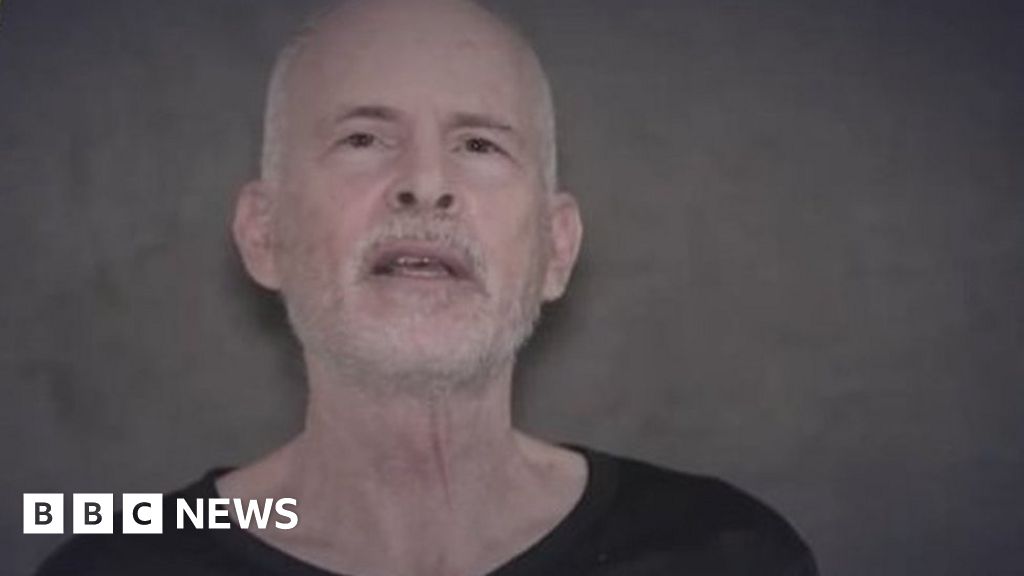THE phone pings and the words ‘Can I tell you a secret?’ pops up on the screen.
This intriguing message, seemingly sent from a young woman, was the start of a living nightmare for countless victims of cyber stalker Matthew Hardy – who used fake profiles to harass at least 62 women over a period of 11 years.
The loner from Cheshire targeted complete strangers, bombarding them with sinister messages, calls and threats, and posing as them to contact friends and family.
The relentless campaign left the innocent women battling anxiety and paranoia, fearing for their lives, and caused relationship break-ups.
Abby Furness, now 24, had suggestive pictures of her sent to her much older boss as well as losing her “first love” because of Hardy’s malicious lies.
Zoe Hallam, 33, tells The Sun she slept with a Samurai sword in her bedroom after being left terrified by up to 200 messages a day – but police refused to take it seriously, telling her they couldn’t check the number targeting her “unless there was rape or murder”.
Lia Hambly, now 26, was too scared to go out in her local town and Hardy even targeted a friend who was about to walk down the aisle, convincing the groom-to-be his bride was a cheat.
Despite her distress, she painstakingly logged every incident, creating a file of over 700 pages, which eventually helped nail their tormentor.
Hardy was finally brought to book by Cheshire Police officer Kevin Anderson, who looked into 100 complaints filed by 62 women across an 11-year period.
In January 2022, Hardy, then 31, was sentenced to nine years in jail – the longest sentence ever handed to a cyberstalker in the UK. Typically just 0.1 per cent of stalkers receive a custodial sentence.
The three brave women, who tell their story in Netflix’s Can I Tell you A Secret?, spoke to The Sun ahead of today’s release – and revealed how their ordeal left them emotionally scarred.
Abby, a dancer, singer and fire-breather from Kent, suffered a two-year terror campaign, from 2019, which still haunts her.
“Before this happened, I was so carefree because I never thought that anything like this could happen to me,” she says.
“I do miss the old Abby, the girl I used to be, because although I am lots of fun now, I’m not as fun as I used to be and I have a constant worrying, paranoid vision of the world.
“I don’t trust people anymore. When people call me, I get nervous and worry about picking up the phone.”
Sinister campaign
Although they’d never met before the documentary, the stories Abby, Zoe and Lia tell are striking in the similarity – each one starting with the same teasing question and quickly escalating into more sinister infiltration of their lives.
“It’s exactly the same story, exactly the same impact,” says Lia, from Kent. “But at the time everyone thought they were alone.
“I thought I was the only one so, now I know there are other girls in the same boat, it makes me think, how did he get away with it for so long?”
Model Zoe, from Lincolnshire was first contacted on Snapchat in November 2018, by someone claiming to be a photographer wanting to set up a shoot but then telling her he wanted to share a secret.
Some friends said ‘don’t flatter yourself’ and a guy I was seeing at the time accused me of lying, and making it up to hide something. That instantly shuts you down
Zoe
Spooked, she contacted the photographer directly and he told her he wasn’t on Snapchat so she challenged the fake user – but then the real nightmare began.
“He set up fake accounts pretending to be me and contacted people in my friends group,” she says.
“He went to quite an effort to make it look quite real, with pictures uploaded over a period of time and adding people that I was friends with.
“He messaged a trainer at the gym I use, pretending to be me, and asked them what number they had on record for me and they gave him my number.
“He posed as my partner’s father and I was talking to him for about a week and a half before I realised that it’s not him. He messaged my best friend and used her dad’s name, and because he knew so much information I assumed he was local.”
Hardy messaged her friends and family members constantly, as well as sending up to 200 messages a day and making silent phone calls, where she could just hear breathing.
At one point, when she was unable to cut the call because of a crack on the phone, she broke down in tears and begged him to leave her alone – but his response was chilling.
“He messaged straight back afterwards saying ‘Why are you crying like a baby?’ and mocking me for being upset,” she says.
“He knew where I went to the gym, what time my classes were, what time I went to work.
“You feel very alone, very isolated and very scared.”
What is cyber stalking?
Online harassment and stalking is illegal in England and Wales.
Stalking is different from harassment as it involves fixation and includes repeated attempts to contact a person without permission in a way that could be expected to cause distress or fear.
Technology and social networking sites can help facilitate stalking and harassment, enabling offenders to impersonate others online or to send or post hostile messages to their victim.
It is important to remember that harassment and stalking can take many different forms and can include e-mails, instant messaging, images, chat rooms, forums or social networking sites.
If you believe that you are in immediate danger as a result of cyber stalking or cyber harassment, or there is a threat to your life, call 999.
Contact your local police if it’s not an emergency.
You can get advice from the National Stalking Helpline.
Telephone: 0808 802 0300
Monday to Friday, 9:30am to 4pm (except Wednesday 9:30am to 8pm)
Zoe’s feeling of isolation was compounded by not being taken seriously by both the people in her life and the police.
“Some friends said ‘don’t flatter yourself’ and a guy I was seeing at the time accused me of lying, and making it up to hide something. That instantly shuts you down and you don’t talk about this.”
“I was living on my own. I reported it five times but the police didn’t seem to want to do anything at all, their only recommendation was to get security lights and come off social media but it doesn’t work when they are making fake profiles and still connect to your new number.
“Even when I gave police the number he was messaging on, early on, they said they could run a check on that but we only do that in high profile cases where there’s been a rape or a murder.
“I said ‘so you’re going to wait for one of those to happen before you do anything?”
Frustrated and afraid, Zoe even began sleeping with a Samurai sword by the bed, in a bid to feel safe.
Holiday nightmare
Abby was 20, in a steady relationship and having the “best time of my life” when she was targeted in 2019, shortly after a trip to Ibiza where she had made a new group of friends.
A message, seemingly from one of her new pals, read “Can I tell you a secret? I know what you did,” and was followed by the accusation she had been talking to another girl’s boyfriend.
She soon established the messages were from an imposter but shortly afterwards, her boyfriend was messaged by two “girls” who claimed Abby had cheated on him with a nightclub security guard.
“I didn’t recognise them but they had a full profile so I knew that they were real girls,” she says.
“I said: ‘I don’t know why they’re messaging you. It must be a girl that just doesn’t like me or they like you and want to break us up.’ Things were never the same after that.”
I was angry we had gone from the police doing nothing, and feeling like I’m being blamed, to nine years in prison. He was doing the same thing the whole time
Zoe
He ended it soon after, saying he couldn‘t trust her. “It was such a low point in my life because I had lost my best friend and my first true love,” she says.
“We were living together and I felt that everything was perfect. Then to have someone trying to mess up my life. I was really confused about who would do this.”
The stalker also used her identity to trick a photographer into sending lingerie him and nude shots she’d done in a tasteful shoot, which he then sent to her former boss, pretending to be her.
When the older man realised he had been duped, he messaged her apologising, filling her with “dread”.
”He said we’ve been having a flirty conversation and I had sent nude photos to him.
“I didn’t want to tell anyone because I was embarrassed and upset because I do have respect for myself.
“I felt so alone. I went from a life of being with all of my friends, carefree, to me not being able to trust anyone. The stalker took on my persona and no one trusted anything I said any more.”
How you can get help
Women’s Aid has this advice for victims and their families:
- Always keep your phone nearby.
- Get in touch with charities for help, including the Women’s Aid live chat helpline and services such as SupportLine.
- If you are in danger, call 999.
- Familiarise yourself with the Silent Solution, reporting abuse without speaking down the phone, instead dialing “55”.
- Always keep some money on you, including change for a pay phone or bus fare.
- If you suspect your partner is about to attack you, try to go to a lower-risk area of the house – for example, where there is a way out and access to a telephone.
- Avoid the kitchen and garage, where there are likely to be knives or other weapons. Avoid rooms where you might become trapped, such as the bathroom, or where you might be shut into a cupboard or other small space.
If you are a victim of domestic abuse, SupportLine is open Tuesday, Wednesday and Thursday from 6pm to 8pm on 01708 765200. The charity’s email support service is open weekdays and weekends during the crisis – [email protected].
Women’s Aid provides a live chat service – available weekdays from 8am-6pm and weekends 10am-6pm.
You can also call the freephone 24-hour National Domestic Abuse Helpline on 0808 2000 247.
Spiral of abuse
Lia’s dossier of damning evidence stretches back to November 2019, when she got a late night message asking “Have you got a minute?” followed by a flurry of questions like “can I trust you?”
By the following morning, she had been inundated with messages and others were messaging saying that they had been contacted by the person overnight.
“It spiralled out of control from there, straightaway,” she says. “It wasn’t just me. I’m the hub but everyone connected to me was getting messages, sometimes about 50 to 60 a day between us.
“He would say that he hates me, that I’m a b**** or he’d pretend to be me and talk to them.”
Hardy would call in the middle of the night, up to ten times an hour from unknown numbers, and he posed as Lia to message her friends’ boyfriends and husbands with suggestive texts.
Lia, who believed her tormentor was a girl until shortly before the trial, was afraid to go out in her local town and when she did, she was confronted by angry pals accusing her of sending vile messages or sexting their partners.
“I was embarrassed, confused and scared,” she says. “Who is this person and why are they doing this?”
I’m never going to get the old version of me back. He has done something to my soul, my heart and my head that I don’t think I’ll ever be able to fix
Abby
One particularly vile ploy was messaging her friend’s fiance, in the run up to their wedding, pretending to be Lia and convincing him that the bride was having an affair with his own father.
Lia reported the stalking to Kent Police but was told to fill in an online crime form. After a second try, when she turned up at the station with her file, and in floods of tears, she claims she was once again told to file online.
Finally, after her employer reported concerns for her safety, she was visited by an officer who looked into the stalker’s numbers and found one had been searched over 500 times by potential victims.
Meanwhile Zoe, with the help of a former partner, had discovered the identity of Matthew Hardy, after he accidentally let his name slip through the net on one of his social profiles, and a quick search unearthed a 2013 article about a previous stalking of a local girl in his home town of Northwich.
Snared at last
But it took Cheshire copper PC Kevin Anderson to finally take the case seriously – and connect all the cases.
Assigned to look into an attack against Hardy’s mother’s home, he looked into the files and found 100 complaints against him, from 62 victims. Hardy had been arrested ten times but, other than the 2013 case, had not been charged.
He began to contact all the victims.
“Kev was the only one that listened and genuinely wanted to help,” says Lia. “He went above and beyond to help us because most people were saying ‘It’s too complicated. We’ll pass that one over.’
“There was a general lack of understanding because, even though it is on social media, it is still a real life crime.”
The investigation found that many of the messages and profiles had been created using Hardy’s router and pictures on his phones corresponded to those used on fake accounts.
Lia’s dossier of files also helped the prosecution bring a case.
Even after his arrest, Hardy bought a new phone and sent more messages to the women as well as harassing a new victim but in October 2021, he pleaded guilty to stalking involving fear of violence and harassment at Chester crown court.
In January 2022, he was sentenced to nine years in jail, which is believed to be the longest sentence handed out in a British court for a stalking offence. It was reduced to eight on appeal.
The minute you use the word “cyber” – as in cyber stalking, cyber harassment, cyber bullying – it’s treated as less of a crime
Zoe
“It was a really strange feeling,” says Zoe. “I burst into tears because I thought someone’s finally taking it seriously and because it stopped him for a while. We finally had some justice and there was massive relief.
“But I was also angry we had gone from the police doing nothing, and feeling like I’m being blamed, to nine years in prison. He was doing the same thing the whole time. How do we go from one extreme to the other?”
Incredibly Zoe has some sympathy for Hardy, after hearing he suffered from undiagnosed autism at school and suffered as a teenager.
But his actions left all three girls traumatised and they are concerned that he will turn to new victims on his release, which could be as early 2025 with a halved tariff.
Many of the victims are now calling for police to take cyber stalking more seriously and for a law change so that fake profiles can easily be traced back to the creator.
“This should be taken seriously by police from the get go,” says Lia. “The common answer shouldn’t be to come off social media. You should have to have your ID connected to each social media profile, not for public knowledge but in the background.
“Hardy was making multiple profiles every day. On one day, he had 63 accounts add me. How is that allowed?”
Zoe adds: “The minute you use the word “cyber” – as in cyber stalking, cyber harassment, cyber bullying – it’s treated as less of a crime. But social media and the internet is so integrated into our lives there’s no divide between online and offline.”
She also believes police communications should work together, so that crimes in different counties can be collated easily.
Abby welcomes Hardy’s groundbreaking sentence with “relief” but feels it is too short.
“He tortured our lives, so many of us and for so many years,” she says.
“I’m never going to get the old version of me back. He has done something to my soul, my heart and my head that I don’t think I’ll ever be able to fix.”
Can I Tell You A Secret? is available on Netflix now.

James Parker is a UK-based entertainment aficionado who delves into the glitz and glamour of the entertainment industry. From Hollywood to the West End, he offers readers an insider’s perspective on the world of movies, music, and pop culture.








